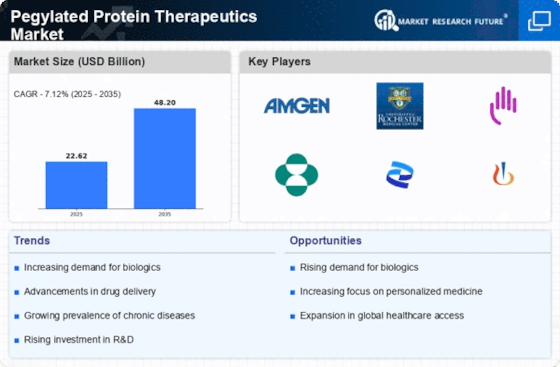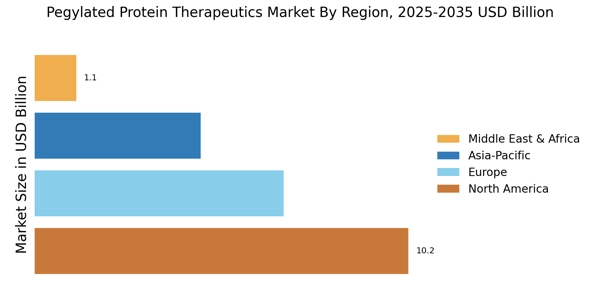Advancements in Biotechnology
Technological advancements in biotechnology are significantly influencing the Pegylated Protein Therapeutics Market. Innovations in protein engineering and drug delivery systems have enhanced the efficacy and safety profiles of pegylated proteins. For instance, the development of novel pegylation techniques allows for better control over the pharmacokinetics of therapeutic proteins. This has led to the introduction of new pegylated drugs that are more effective in treating various conditions. The market for pegylated therapeutics is expected to witness a compound annual growth rate (CAGR) of approximately 8% over the next few years, driven by these advancements. As biotechnology continues to evolve, it is likely that the range of applications for pegylated proteins will expand, further stimulating market growth.
Regulatory Support for Biologics
Regulatory bodies are increasingly supportive of biologics, including pegylated protein therapeutics, which is a crucial driver for the Pegylated Protein Therapeutics Market. Streamlined approval processes and guidelines for biologics have encouraged pharmaceutical companies to invest in the development of pegylated therapies. For example, the U.S. Food and Drug Administration (FDA) has established clear pathways for the approval of biologics, which has led to a rise in the number of pegylated products entering the market. This regulatory environment not only fosters innovation but also enhances patient access to these therapies. As more pegylated therapeutics receive regulatory approval, the market is likely to expand, reflecting the growing acceptance of biologics in treatment protocols.
Rising Prevalence of Chronic Diseases
The increasing incidence of chronic diseases such as diabetes, cancer, and autoimmune disorders is a primary driver for the Pegylated Protein Therapeutics Market. As these conditions require long-term treatment, the demand for effective and sustained therapeutic options is surging. Pegylated proteins, known for their extended half-lives and reduced immunogenicity, are becoming essential in managing these diseases. According to recent estimates, the prevalence of diabetes alone is projected to reach 700 million by 2045, indicating a substantial market opportunity for pegylated therapeutics. This trend suggests that pharmaceutical companies are likely to invest more in developing pegylated formulations to address the growing patient population, thereby propelling the market forward.
Growing Investment in Biopharmaceuticals
The surge in investment in the biopharmaceutical sector is a notable driver for the Pegylated Protein Therapeutics Market. As investors recognize the potential of biologics, funding for research and development in this area has increased substantially. This influx of capital is facilitating the discovery and commercialization of new pegylated therapeutics. Reports suggest that the biopharmaceutical market is projected to reach over 500 billion by 2026, with a significant portion attributed to pegylated products. This trend indicates a robust interest in developing therapies that leverage the advantages of pegylation, such as improved pharmacokinetics and reduced immunogenicity. As investment continues to flow into this sector, the pegylated protein therapeutics market is likely to experience sustained growth.
Increased Focus on Patient-Centric Approaches
The shift towards patient-centric healthcare is driving the Pegylated Protein Therapeutics Market. Patients are increasingly seeking treatments that offer improved convenience, efficacy, and reduced side effects. Pegylated proteins, with their extended release profiles, align well with these patient preferences, as they often require less frequent dosing compared to traditional therapies. This focus on patient outcomes is prompting pharmaceutical companies to prioritize the development of pegylated formulations. Market Research Future indicates that patient adherence to treatment regimens improves significantly with therapies that require less frequent administration. Consequently, the demand for pegylated protein therapeutics is expected to rise, as healthcare providers and patients alike recognize the benefits of these innovative treatments.


















